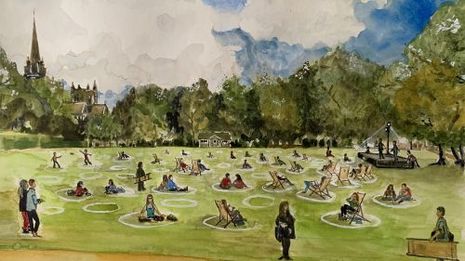Varsity investigates the differences between college regulations
Colleges have been forced to develop innovative ways to allow safe socialising to continue

As the start of term begins and students return to drastically changed colleges, Varsity investigates the differences in regulations between colleges, and colleges’ attempts to keep things as normal as possible.
The introduction of ‘households’ is the biggest single change that students living in college accomodation will face this year. The University defines a ‘household’ as any “College accommodation that includes a shared bathroom/shower and/or toilet and/or kitchen area.”
Every college has divided students into households, although there are differences in the size of a household depending on space in the college.
Generally, students do not have to practice social distancing in their households. Wolfson, however, has taken an unusual approach to households, and in an email sent to students this week asked “all residents to practice social distancing…even in your accommodation block/household until after the first 14 days of term.”
This, they explained, was due to “new students arriv[ing] from across the country (and indeed from across the world)”. While Wolfson admitted the policy “cannot be monitored or enforced…[it] is the best way to prevent a ‘spike’ of infections in a household at the start of term”.
With the introduction of households, as well as the government’s ‘rule of six’, all colleges are having to strictly regulate socialising between households. Almost all have a ban, at least for the first two weeks, on non-household members entering college households.
Some colleges have adopted a more liberal approach, like Downing, which allows guests into a household if it is agreed “with other members of your Household which guests will come and when they will visit.” Unusually, Downing is also allowing overnight guests, saying: “overnight guests should be agreed in advance with other members of the Household Group.”
St John’s operates a slightly different policy, allowing any student or fellow to invite up to two people “who also reside on the main College site to visit them in their room.” Queens’ takes a similar approach, writing “only College members are permitted onto the main site or into Owlstone Croft and the outside houses” but also says, for college members, “if you are meeting in a household space, you should agree, in advance, with other members of your household which guests will come and when they will visit.” However, Queens’ have specified that “there will be no overnight guests permitted in college households.”
Other colleges, such as Murray Edwards, have a ban on visitors from other households until 20th October. The rule will then be reviewed with the intention of “taking a progressive approach as soon as we can.” Girton, too, has “elected to have visitors to the households for the first 2 weeks of term, to allow households to establish, and then to determine what changes might be possible within the guidelines at the end of that period.”
Homerton, on the other hand, states: “no guests are permitted on site and/or in accommodation rooms.” The college also requires students to get consent from the college for any overnight stays outside of college. Similarly, Churchill says “no visitors or overnight guests from other households [are allowed] within college”, nor “visitors or overnight guests from outside of college.”
With these restrictions in place, students have to do all of their inter-household socialising outside in groups of six or less. Some colleges have been more proactive than others in establishing suitable outdoor socialising areas for students. Downing, for example, have built an extension to the college bar called the Butterfield Taverna. “The Taverna features ten socially-distanced, covered seating areas.” This will allow “the regular music, comedy and quiz nights…[to] take place in an intimate, walled and tree-lined enclosure that also meets the essential health guidelines necessary for our mutual wellbeing.”
They have also established a “new open-air performance space, the Downing Amphitheatre.” This features “one hundred and fifty circles marked on the ground, radiating outwards in a fan-shape from a raised, outdoor stage area. Each circle will be two metres in diameter and two metres away from any other.” Each circle will also have a deckchair.
Sidney Sussex are trialling a ‘barquee’ – the college bar moved into a marquee – with a limited capacity but with the possibility of opening it up to larger groups of people if the trial proves successful. Groups of ten are permitted if they are all from the same household, and up to six from three households can book to sit together at one of the tables in the ‘barquee’.
Selwyn have also placed a large marquee in Old Court, “providing extra space near to the servery and Hall. It will also allow for socially distanced meetings: for instance, some of the freshers’ welcome events.”
While students are unable to socialise in groups of larger than six unless they are all members of the same household, colleges are able to organise ‘official’ events that allow larger groups to socialise providing social distancing is maintained.
For example, Corpus Christi, in a statement detailing the college’s regulations, explain that “the College, as a COVID-secure organisation, is able to organise events for larger groups, subject to COVID-secure regulations and provided they are reasonably necessary for the purposes of education. “Therefore, any event or activity planned by the JCR or MCR, any College Society or any individual student, must either be limited to a maximum of six people (or one household) as described in Section 6, or it must be organised as a College event.”
All of the new policies that colleges have developed have raised questions about how they will be enforced. Many colleges have suggested that students must police each other and have thus established anonymous reporting systems through which students can report on breaches. Churchill, for example, have confirmed they “expect that students report observed breaches of the guidelines in confidence to their tutors or to the JCR/MCR welfare officers.”
Fitzwilliam is taking a slightly more conciliatory approach, saying “if you notice that someone has made a mistake and overlooked guidelines, please let them know in a friendly and polite way. Or if someone else reminds you of your own slip, please don’t be offended as we’re all just trying to keep everyone safe.”
However, it seems some colleges are not confident that this policy will always be effective. In an email sent to students at Jesus, for example, it was revealed that “porters will be doing spot checks on communal areas in households to enforce the College’s approach.”
While the rules established by all the colleges will be under constant review, it is clear from the beginning that some are taking a more relaxed approach to Covid-19 restrictions than others. Whether that will remain the case through the duration of the term remains to be seen.
 News / Clare Hall spent over £500k opposing busway 24 December 2025
News / Clare Hall spent over £500k opposing busway 24 December 2025 Comment / The ‘class’ of Cambridge24 December 2025
Comment / The ‘class’ of Cambridge24 December 2025 News / Caius mourns its tree-mendous loss23 December 2025
News / Caius mourns its tree-mendous loss23 December 2025 News / Girton JCR publishes open letter expressing solidarity with Palestine25 December 2025
News / Girton JCR publishes open letter expressing solidarity with Palestine25 December 2025 Comment / Yes, I’m brown – but I have more important things to say22 December 2025
Comment / Yes, I’m brown – but I have more important things to say22 December 2025










